|
 |
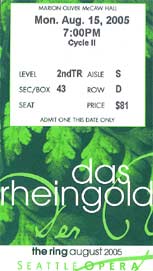 |
There was
no correlation for the Rhinemaidens (or Rhine Daughters)
with any particular saga; it seems purely an invention
of Wagner, based on stories of water fairies, who were
often mischievous.
The Rhinemaidens frolicked in the Rhine, while guarding
a lump
of enchanted
gold for their father.
[Quibble:
The father, for whom the Rhine Maidens were guarding the gold,
is unspecified and unexplained, possibly representing a power
that preceded the gods themselves. It is clear that this father
is NOT Wotan. While the gold often ends up in the Rhine, it is
only with Wagner that it originates from the Rhine, instead of
from the Nibelungs.] |
The Nibelung Alberich, who somehow appeared from the subterranean
depths, coveted the gold, but he was told that it was useless
unless he could foreswear love. |
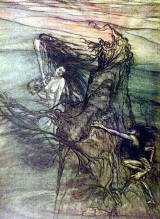 |
At
Seattle Opera, these scenes were done through an obscuring
curtain, with the Rhinemaidens on trapezes.
Somehow, Alberich
was able to swim without drowning, and he finally was
able to steal the gold. This was a total surprise to the Rhinemaidens,
who wondered how an obvious flirt could manage this. Alberich
plunged into the depths, heading back to Nibelheim, leaving
darkened waters
behind him.
Back in Nibelheim, Alberich was able to transform
the gold
into the
Ring of
Power.
[Quibble:
How was Alberich able to convince the powers that be that he
had actually foresworn love? Perhaps
it was because he had so few social graces, that he could
never have gotten a date anyway?]
|
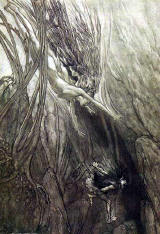 |
Freia
was the goddess of fertility, and Wotan's sister-in-law. One
of her chief jobs was to maintain the tree that produced
the Golden
Apples,
that
gave the gods
their immortality.
This fact seemed to have been forgotten, when Loge, acting
for Wotan, promised Freia to the Giants, as payment for constructing
Wotan's fortress, Valhalla. Since Wotan was quite
sexist, he had excluded women from all the bargaining.
Wotan was essentially bankrupt, so this was a delaying tactic
while he sought alternate funding. Again, Loge's advice was
nearly always bad advice.
|
 |
The
Giants, the brothers Fasol and Fafner, demanded their payment,
so they proceeded to take Freia. For them, there was nothing
around more valuable and desirable than Freia, and they were
not interested in any intellectual arguments; they were only
interested in payment for their services.
While the Giants were not particularly powerful, and while
Wotan had subdued their race, he could not simply use force
against them, because of those pesky
runes on
his spear. |
 |
Without
Freia tending her apples, the gods began to age. Loge reminded
Wotan about the story of the Ring, and suggested that Wotan
take the Ring from Alberich by force, since Alberich had
stolen
it
in the first
place.
When the gold
was offered to the Giants as an alternative payment, they became very interested,
since they were jealous of the Nibelung's power.
They agreed to consider the gold, but only after
they
had
seen it.
Wotan and Loge entered into the depths, as they headed toward
Nibelheim, the world of the Nibelungs.
[Quibble:
Why did Wotan want the
Ring anyway, since he is the character least likely to be
able to foreswear
love?] |
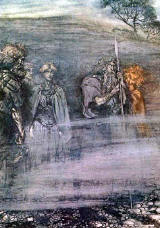 |
Deep
in a cavern in Nibelheim, Alberich had forced his brother,
Mime, to create the magical head piece, the Tarnhelm (magic
helmet,) that allowed the wearer to change shape or become
invisible. I assume that this was through the power of the
Ring.
Alberich tested the Tarnhelm by using it to turn
himself invisible, and then proceeded to terrorize Mime.
Alberich discovered that he could now also read Mime's mind,
and he
slapped his brother for having thoughts of possessing the
Ring; then he left his brother alone, while he attended to
other business.
|
 |
The power of
the Ring had driven Alberich to become a tyrant, literally
enslaving his fellow Nibelungs, as he forced them to mine a
hoard of gold for him. Alberich had mastered the Ring, but
he had become extremely uncivil, and his fellow Nibelungs despised
him.
Meanwhile, Wotan and Loge had arrived,
and Loge immediately started to work with the disgruntled Mime,
to find a way to get the ring from Alberich. |
 |
Alberich
returned and discovered Wotan and Loge as intruders,
and he remembered his dislike of dealing with Loge.
Wotan and Loge used
cunning to banter with Alberich, while they searched for
weakness in the Nibelung's
defenses.They urged
Alberich to display his powers; Alberich transformed himself
into a serpent.
Finally, Wotan tricked Alberich into transforming
himself into a small gray toad, at which point Wotan captured the
toad.
|
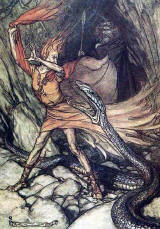 |
Wotan
and Loge returned to their surface glade in the forest, across
a valley from Valhalla, with a very angry and distraught
Alberich in their grip. Wotan made Alberich force his Nibelung
workers to deliver the hoard of gold. Finally, Wotan demanded
the Ring, as the final payment for Alberich's freedom.
Alberich was set free, but he proceeded to put a curse upon
the Ring.
[Quibble:
If he no longer had the Ring, how could he do this?]
This was the curse that set the stage for the rest of
the operas.
Wotan proceeded to bargain with the Giants, offering to
exchange the gold for Freia. The Giants wanted the pile
of gold to be so huge
that it obscured their view of Freia, but there was a small
hole in the pile.
The Ring could have plugged the hole, but Wotan did not want
to part it. |
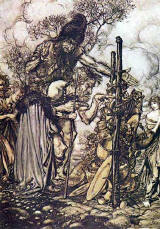 |
Erda,
the goddess of the Earth, suddenly arose from the ground
next to Wotan. She warned Wotan that he must part with the
Ring,
for
she had seen the destruction of the Gods, as the curse played
out.
Reluctantly, Wotan handed the Ring to the Giants.
Freia became a free woman. |
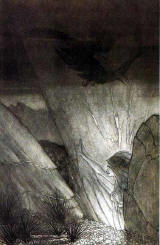 |
Immediately,
Fasol and Fafner began to fight over the booty they had collected.
Loge urged that Fafner be given possession of the Ring, so
that he could guard its powers. Fasolt grabbed the Ring, then
Fafner
killed his brother with one blow from his staff.
So began the curse of the Ring, as Fafner left with the gold,
the Ring, and the Tarnhelm.
Fafner would use the Tarnhelm to transform himself
into a dragon, in which form he would lazily watch over all
the treasure.
[Quibble:
This seems like a strange and uninspired end choice of transformation
for Fafner, so it must be another of these mythology things.
Or maybe, as a child, he actually dreamed of being a dragon
some day, in which case he probably needed therapy.] |
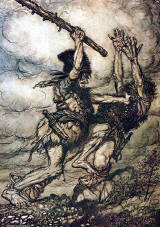 |
As
soon as Fafner had left, the gods rejoiced that the dilemma
had been resolved; of course, they had overlooked the
curse of the Ring.
Wotan's son Donner (=Thor) cleared the air, allowing the rainbow
bridge to form.
Loge decided to return to pure flame, not to be personified again
in the other operas.
Triumphantly, the gods entered Valhalla via the rainbow
bridge, while far below, the Rhinemaidens lamented the loss of
their treasure.
[Quibble:
Loge looked and dressed too much like the other gods in this
production. Other productions have him looking much more sinister
and fiendish.]
|
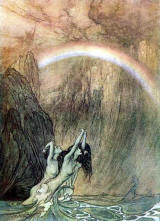 |
Das Rheingold Libretto
Die
Walküre |
|
|
|